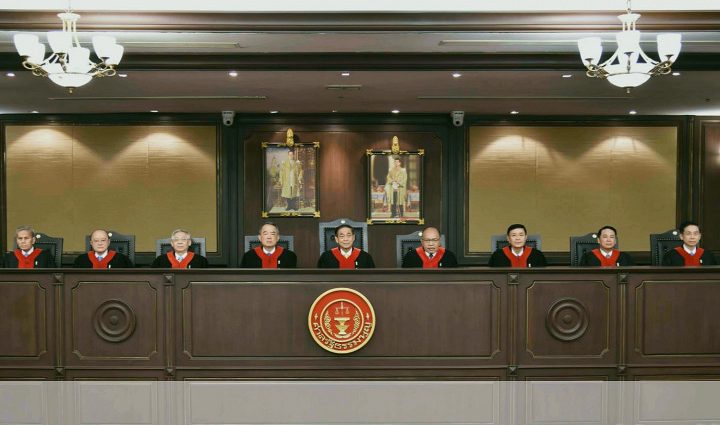Constitutional Court says campaigning to amend Section 112 amounts to attempting to overthrow constitutional monarchy

The Constitutional Court has ordered the Move Forward Party to cease all attempts to amend the lese-majeste law, saying that campaigning on the issue is considered an attempt to overthrow the constitutional monarchy.
The ruling on Wednesday against the party that won the most votes — 14.4 million — in the May 2023 election could set a precedent for any future review of one of the world’s strictest royal defamation laws.
Move Forward said in a statement that it was reviewing the ruling with its legal team and would have a response shortly.
The court had no remit in this particular case to prescribe punishments for Move Forward, but some politicians have suggested legal efforts could now begun to seek the dissolution of the party and political bans for its leaders.
In a worst-case scenario, Human Rights Watch noted, 44 Move Forward MPs who signed the proposal to amend Section 112, including former leader Pita Limjaroenrat, could face a lifetime ban from politics for breaching the parliamentarians’ code of ethics.
The lese-majeste law, Section 112 of the Criminal Code, carries penalties ranging from 3 to 15 years in jail for each perceived insult of the king, queen, heir to the throne or regent.
Move Forward’s proposed amendments to Section 112 included reduced sentences, as well as a requirement that a complaint must be filed by the royal household.
Currently, anyone can file a complaint of lese-majeste against anyone else, and the police are obliged to investigate. As a result, Move Forward and others have argued, Section 112 is used frequently for political reasons.
The party’s stand has outraged conservatives and was also cited as the main reason its attempt to form a government last year was torpedoed by the non-elected Senate.
Move Forward’s predecessor, Future Forward, was disbanded for violating campaign funding rules and its former leader and prime minister candidate Thanathorn Juangroongruangkit was disqualified over a shareholding issue.
Before the ruling was announced on Wednesday, Mr Thanathorn said he believed lese-majeste should be up for discussion.
“The law is not a fax paper sent from God. It’s written by human hands, therefore people can amend it,” he told reporters.
“If the lawmakers cannot amend the laws, I think something is wrong in the country.”
Critics say Section 112 has been interpreted so broadly in recent years as to shield the the royal family from any kind of criticism or mockery.
Earlier this month a man was sentenced to 50 years in prison for a series of Facebook posts deemed insulting to the monarchy.
And in March last year a man was jailed for two years for selling satirical calendars featuring rubber ducks that a court said defamed the king.
The yellow bath toys were an unexpected symbol of mass youth-led street protests that shook Bangkok in 2020.
According to data from Thai Lawyers for Human Rights to Dec 31 last year, 1,938 people have been prosecuted for political participation and expression since the beginning of the Free Youth protests in July 2020. At least 262 are facing lese-majeste charges under Section 112 and 138 have been charged with sedition under Section 116. Nine cases under Section 116 came before the courts in December and all were dismissed.

